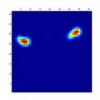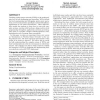1019 search results - page 93 / 204 » Managing Complexity in Large Learning Robotic Systems |
CVPR
2006
IEEE
14 years 10 months ago
2006
IEEE
With the growing interest in object categorization various methods have emerged that perform well in this challenging task, yet are inherently limited to only a moderate number of...
SPLC
2004
13 years 9 months ago
2004
The problem of managing the evolution of complex and large software systems is well known. Evolution implies reuse and modification of existing software artifacts, and this means t...
IROS
2007
IEEE
14 years 2 months ago
2007
IEEE
— Any system that has the capability to diagnose and recover from faults is considered to be a fault-tolerant system. Additionally, the quality of the incorporated fault-toleranc...
ALT
2001
Springer
14 years 11 days ago
2001
Springer
We develop a theory for learning scenarios where multiple learners co-exist but there are mutual compatibility constraints on their outcomes. This is natural in cognitive learning...
ITICSE
2010
ACM
13 years 8 months ago
2010
ACM
Teaching wireless sensor networks (WSNs) at the undergraduate level is both challenging and rewarding. WSNs include low-level programming and debugging, power-aware operations, no...


